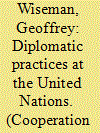| Srl | Item |
| 1 |
ID:
188533


|
|
|
|
|
| Summary/Abstract |
As recent work in border studies has argued, EU-border externalisation is often achieved by exporting technocratic management templates and advanced surveillance technologies, prompting scholars to adopt the lens of biopolitics in studying borderwork. Outside of Europe, however, the paucity of resources and vastness of spaces mean that indigenous forms of agency continue to be a key factor of border governance. Focusing on everyday practices illuminated by ethnographic fieldwork, this article investigates EU border externalisation’s encounter with the Sahelian context. It argues that state and non-state actors form, deform and perform borders by extracting and capturing the material (economic) and immaterial (cognitive) resources that pass through liminal spaces. These dynamics shape a biopolitical economy of border control in which features of exceptionality, sovereignty and politics seem less compelling that those pertaining to the sphere of ordinary, hybridity and economy.
|
|
|
|
|
|
|
|
|
|
|
|
|
|
|
|
| 2 |
ID:
141722


|
|
|
|
|
| Summary/Abstract |
This article considers the importance of informal, practice-based change as opposed to formal change at the UN. I first evaluate UN reform, showing that diplomacy and institutional change within the UN system are better understood as having evolved less from major, formal reform of the UN Charter (‘the Charter’) than from minor changes in routine practices. I then examine what practice theory and diplomatic studies can learn from each other in terms of how each views the role of leading individuals, illustrating specific practice-based change in relation to the Secretary-General’s role. Next, I show how the appointment process for a new Secretary-General has evolved through informal practice, after which I advance an argument that UN diplomatic practices should be considered not only within the narrow context of a formal diplomatic corps of member state diplomats but also as part of an informal, wider diplomatic community of diplomats and non-state actors. Practice theory helps students of diplomacy think more abstractly and systematically about mundane diplomatic practices. Students of diplomacy can help guide practice theory toward empirical diplomatic activities that are often internalized and taken for granted. I conclude that a dialog between the two fields will promote a better understanding of diplomacy as undervalued practices.
|
|
|
|
|
|
|
|
|
|
|
|
|
|
|
|